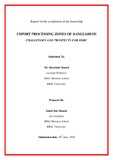| dc.contributor.advisor | Ahmed, Riyashad | |
| dc.contributor.author | Md. Masrur, Zahid | |
| dc.date.accessioned | 2014-06-29T10:15:27Z | |
| dc.date.available | 2014-06-29T10:15:27Z | |
| dc.date.copyright | 2014 | |
| dc.date.issued | 2014-06-26 | |
| dc.identifier.other | ID 10104056 | |
| dc.identifier.uri | http://hdl.handle.net/10361/3373 | |
| dc.description | This internship report is submitted in a partial fulfillment of the requirements for the degree of Bachelor of Business Administration,2014. | en_US |
| dc.description | Cataloged from PDF version of Internship report. | |
| dc.description | Includes bibliographical references (page 21). | |
| dc.description.abstract | The present business world is continuously expanding due to the course of globalization and
international trade in a spontaneous way. Being a developing country Bangladesh has made
its footsteps on this international business environment by the help of its Export Processing
Zones (EPZ) which are the places provided by the government specialized in manufacturing
export oriented products and services maintained by proper standards and guidelines.
HSBC, one of the leading and most prominent international banks operating in Bangladesh,
has revolutionized the concept of corporate institutionalized banking to an outmost
superiority. To achieve substantial growth over the competitors, HSBC is continuously
rendering different kinds of services to its corporate clients.
This paper describes some potential opportunities for HSBC regarding the EPZ of the country
where HSBC can invest their assets to generate a huge amount of revenue in the upcoming
years. Though HSBC has always been the market leader in the EPZ segment, but it holds less
than half of the market share which they can maximize by improving some service oriented
challenges and providing exclusive services to this segment.
This report observes the trend of the EPZ business, the customers we have in our portfolio
regarding the investment flow and demand for services. It also covers the understanding of
the visits to the existing and potential EPZ customers on different location. We have analyzed
the service related gaps and proposed some solutions to increase the quality of the services as
well as we have suggested some ways to increase the share of this segment for HSBC DAKs
wallet.
The report contains survey results conducted on various time by HSBC and other statistical
bureau and it covers ample amount of data from different regulatory bodies who are
managing the EPZ alongside the government intervention. Some data and recommendations
may subject to change over the time and the complexity of the service issues. | en_US |
| dc.description.statementofresponsibility | Zahid Md. Masrur | |
| dc.format.extent | 27 pages | |
| dc.language.iso | en | en_US |
| dc.publisher | BRAC University | en_US |
| dc.rights | BRAC University Internship reports are protected by copyright. They may be viewed from this source for any purpose, but reproduction or distribution in any format is prohibited without written permission. | |
| dc.subject | Business administration | en_US |
| dc.title | Export processing zones of Bangladesh-challenges and prospects for HSBC | en_US |
| dc.type | Internship report | en_US |
| dc.contributor.department | BRAC Business School, BRAC University | |
| dc.description.degree | B. Business Administration | |

